Ukraine sunflower crisis hits everything from chips to sweets

Sunflower oil prices have gone up 1,000%. File photo
Russia’s invasion of Ukraine has disrupted the supply of almost half of the world’s sunflower oil exports, forcing companies to turn to less desirable alternatives such as palm oil in products ranging from potato chips to biscuits.
Thousands of items, also including ready meals and even wrapping paper, use sunflower oil. Prices are surging and the ingredient will only become more scarce from the summer as Ukrainian farmers may struggle to grow and export the crop.














